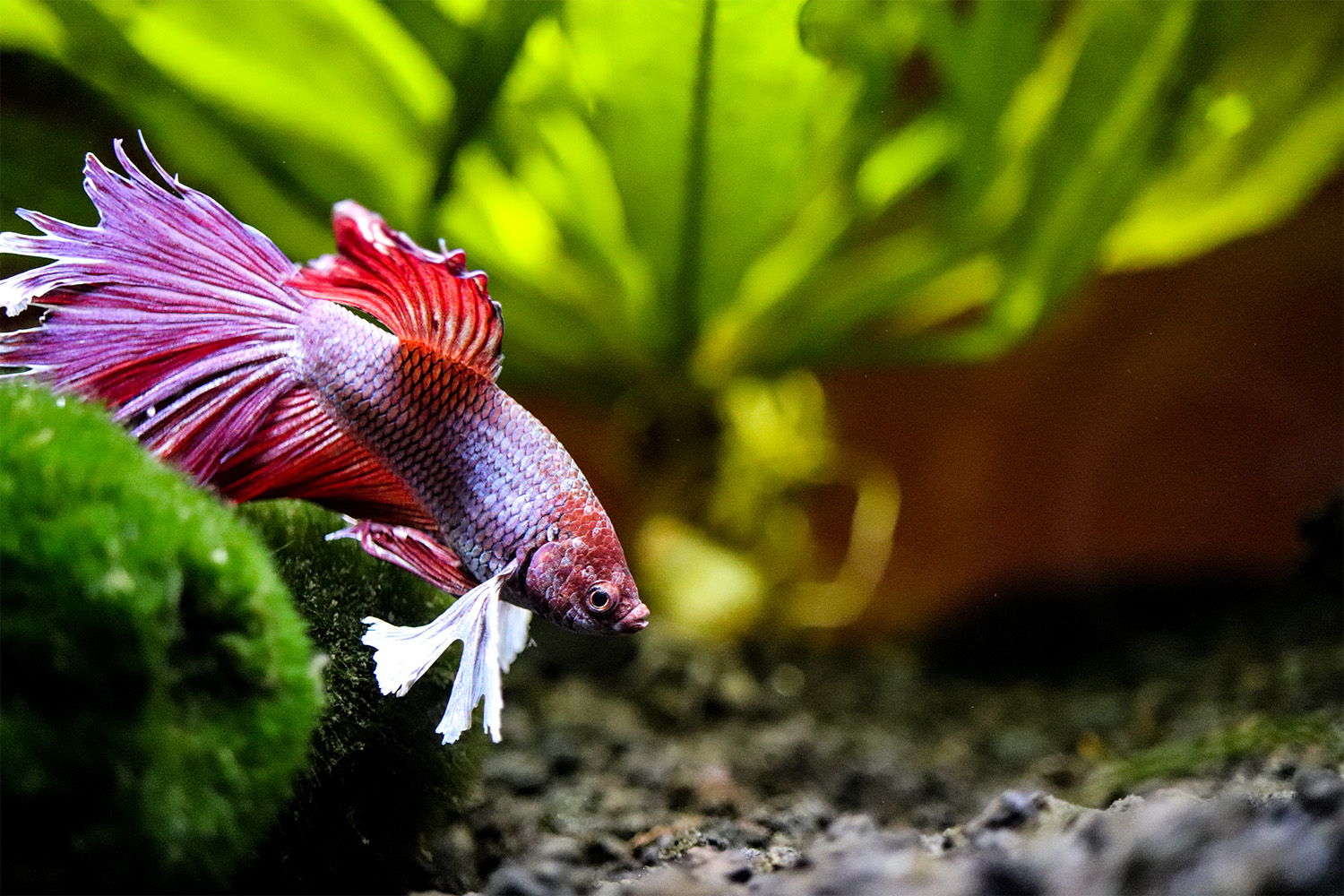Perhaps one of the first things that you associate with the Betta Fish is a fighting fish. Their perceived aggressiveness towards other fish might have you wondering if they are a fish that you can cohabitate with other species. The short answer is: yes.
But there are certain fish that can live better with Betta’s so that everyone can be comfortable and content. The last thing you want to do as a fish lover is for your fish to be unhappy in their environment. You don’t want anyone to fight, and you would much rather watch your little companions live peacefully together as part of an ecosystem. You want every day to be like an underwater pool party for your fishy friends!
If you are wondering if your Betta is lonely, they might be. So, it’s good to know what kinds of fish will do well in your tank alongside them. Not every fish is the same, and they have their own individual needs that need to be considered before adding them to your tank.
Keep reading to find out which underwater friends would live happily with your Betta:
A Little Bit of Background on the Betta
Betta fish are the beautiful, multi-colored, solitary fish you usually see upon entrance into any pet store. They are a beautiful fish that comes in an expansive variety, making each one unique from the next. These fish are known to be aggressive, fighting fish, so many people are unsure of whether or not they would do well in a larger fish tank setting.
What Is the Temperament of Betta Fish?
When it comes to temperament, the sex of your fish can determine how they act with other fish. In organized fish fighting competitions, male Betta fish were pitted against each other. These contests are often protested and are slowly being shut down.
Unfortunately, male Betta fish are known to be aggressive towards each other. Therefore, keeping two male Betta fish in a tank could result in fighting. Otherwise, Betta fish do well with a variety of other fish.
Another factor that might play into their aggressiveness is how big their tank is. The more space they have, the less likely they are to pick a fight with any other fish.
What a Betta Needs from a Tank
Often, Betta’s start off in tiny containers that they aren’t meant to live in forever. If you want to give your Betta fish a good life, you need to give them space to swim around in.
Best Tank Size for Betta Fish
Bettas can be kept in tanks as small as five gallons. Note that the smaller the tank size, the less likely they are to get along with other animals. While a five gallon tank can fit them comfortably, the larger you go, the more fish you can add. A Betta fish will be happier the larger the tank and with more enrichment.
As you expand to larger gallon tanks, like ten gallons, 15 gallons, or even 20 gallons, the variety of fish you can add in with your Betta becomes more complex.
Optimal Water Temperature and pH Levels for Betta Fish
It is important to note that all fish have slightly different water needs, such as pH balance, temperature, hardness, and flow strength. By choosing fish that can accommodate themselves to a similar environment as your Betta, you will have happy and healthy fish.
A typical Betta will require their water temperature to be around 78 degrees, so coldwater fish might not do as well in this setting.
What Fish Can Live With Betta Fish?
If you want to know what fish would do best with your Betta fish because you are looking to expand your fish tank, you’ve come to the right place:
First of all, you don’t want your Betta to become overly territorial, so before adding any fish to your tank, you want to ensure plenty of live plants and coverage. This will allow your Betta to “escape” and take some time to relax without feeling overwhelmed. Sometimes we all need a little space to decompress!
You can never truly know how your Betta will react, but if they have ample space and area to swim in, things should turn out just fine with the following fish.
Nerite Snails
If you are keeping your Betta in a smaller tank, like a five-gallon tank, it’s not advised to put other fish in the tank. A great alternative to fish would be including snails in the tank with your Betta.
Snails are unlikely to get in your Betta’s space and cause any issues. This is also a good test of how your Betta might act if you decide to upgrade to a larger tank and introduce new fish down the line.
Nerite snails are one of the best options to go with if you are looking for a non-invasive snail. They are fantastic at eating up algae and tend to avoid snacking on the live plants in your aquarium. These little snails come in a variety of colors and distinctions; some even sport horns!
They prefer that you keep their water temperature between 72 and 78 degrees Fahrenheit, with a water pH level between 7.0 – 8.7. They can live up to two years and make a wonderful tank-mate to have.
Malaysian Trumpet Snails
The Malaysian Trumpet snail is another snail that would do well in a space with Betta fish. These snails are, as you might have guessed, found in Malaysia and other parts of Asia. They only grow to about one inch in size and keep to themselves — true introverts of the aquatic world.
Malaysian Trumpet snails enjoy their water between 70 and 78 degrees Fahrenheit, which means they will do well alongside a Betta. Their pH level should rest between 7.0 – 7.5.
You will have to keep an eye on these snails because if they begin to breed, the population can quickly become uncontrollable. They are capable of having many babies and can easily overrun your Betta’s tank.
Ember Tetras
While the Ember Tetra is a petite fish, they need more space than just a five-gallon tank. These fish are fast, making it a lot easier for them to avoid a Betta fish, or at least swim away before any issues can arise. They are a bright red color that makes them appear faster than they are.
One reason why the Ember Tetra needs more space is that they do best in groups. Otherwise, they can become very depressed, which can lower their lifespan. They thrive in temperatures between 73 and 84 degrees Fahrenheit.
Kuhli Loach
These fish, which kind of look like eels, grow up to 3.5 inches long and need at least 15 gallons of tank space. These cool guys are ultimately no risk with your Betta because they will stay away, cleaning up after the food that your Betta drops.
They are also nocturnal, so during the day, they will hide away and not bother your Betta. At night, they look for food along the bottom of the tank and help to keep it clean.
They require water temperature between 70 and 79 degrees Fahrenheit but will definitely thrive in a space shared with Bettas.
Platy Fish
The platy fish is a very easy-to-care-for fish, making them ideal for beginner fish keepers. “Platies” are peaceful and tend to get along well with Betta fish because they stay out of their way.
These fish are known as livebearers, which means that if you put a group of them into a tank, they are going to multiply. What comes with this is the need for a larger tank.
We recommend you keep Platies if you have a 15-gallon tank so that when they multiply, you have the space. They thrive in water between 68 and 79 degrees Fahrenheit, though they prefer neutral to alkaline water conditions, usually between 7.0 – 8.3.
Corydoras Catfish (20 Gallon)
The Corydoras Catfish is a bottom-dwelling fish that tends to stay out of the way of Betta fish. They like to be in small groups and get along well with other kinds of fish. This makes them relatively easy to take care of, and in return, they keep your tank nice and clean.
These catfish can grow up to 2.5 inches in length and live for ten years, so you have to have plenty of space for them to grow and thrive. This means a 20-gallon tank minimum.
There are many types of Cory Catfish, like the Pygmy Corydoras and Bronze Corydoras, but all of them will do well with a Betta. It’s important that you keep any Corydoras in a pack of at least six so that they don’t become anxious or unhappy. They require a water temperature of 72 and 82 degrees Fahrenheit and a pH level of 5.8 – 8.0.
A Pool of Experts
Having questions about your fish is completely normal, and you should have a space where you can ask your questions. With AskVet, you have the ability to ask a team of Certified Pet Lifestyle Coaches™ questions at any point in the day. If something is going on with your Betta and you are concerned, a CPLC™ is here to help.
We get that having fish is not just an easy thing to do. There is more thought and effort that goes into keeping them healthy and happy than one might think. But we see you, we hear you. We know how much those little guys mean to you! And we want to see them happy just as much as you do.
When you schedule an appointment with a CPLC™ today, you only have to pay $9.99/month, and you get 24/7 access to our trained professionals. Dive in today!
Sources:
Evolution, Culture, And Care For Betta Splendens | University Of Florida
Your Betta Needs More Than A Bowl | Veterinary Medicine At Illinois
Xiphophorus Maculatus (Southern Platyfish) | Center For Agriculture And Bioscience International
Betta Fish: The Beautiful, and Very Popular, Siamese Fighting Fish | Live Science





